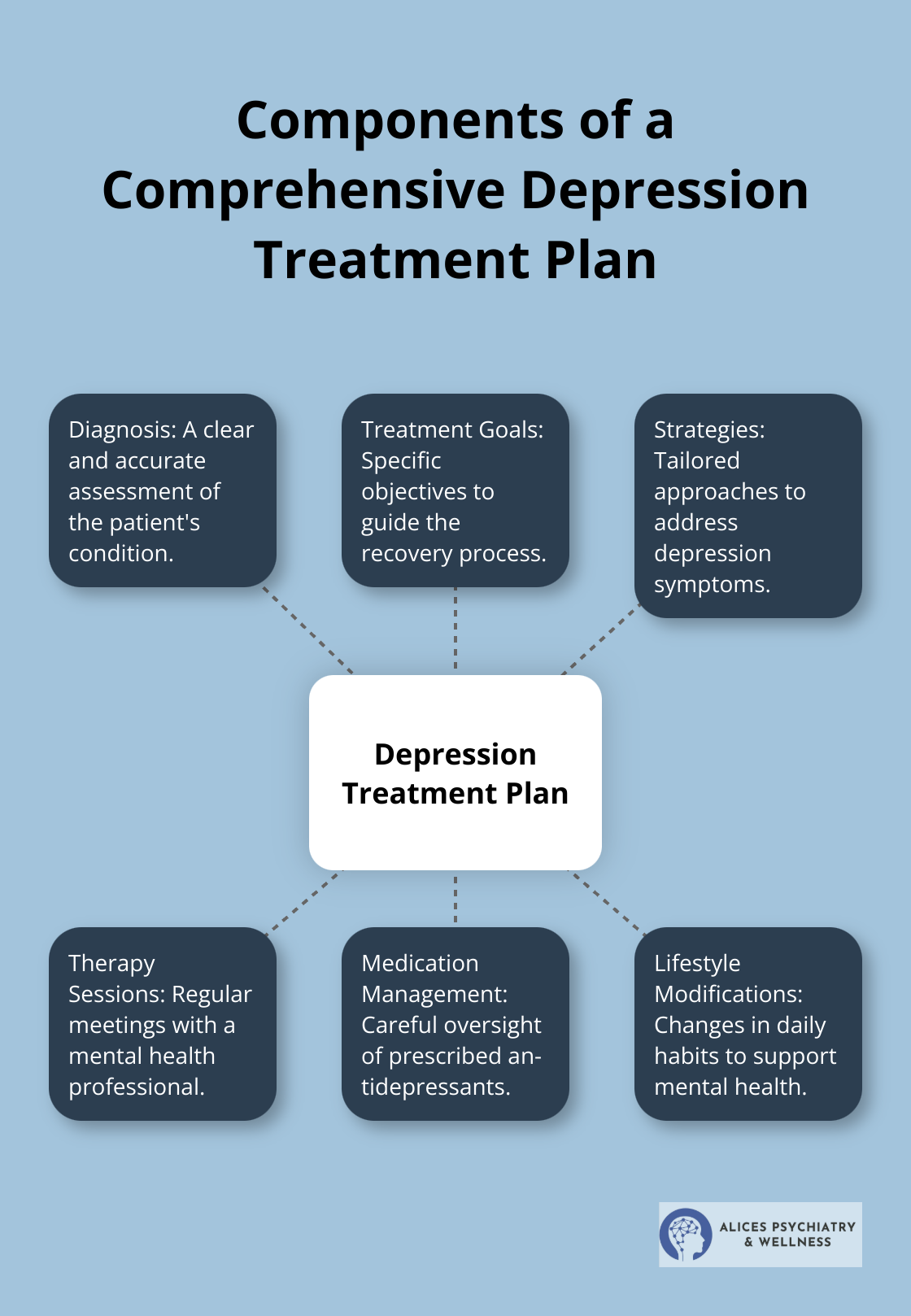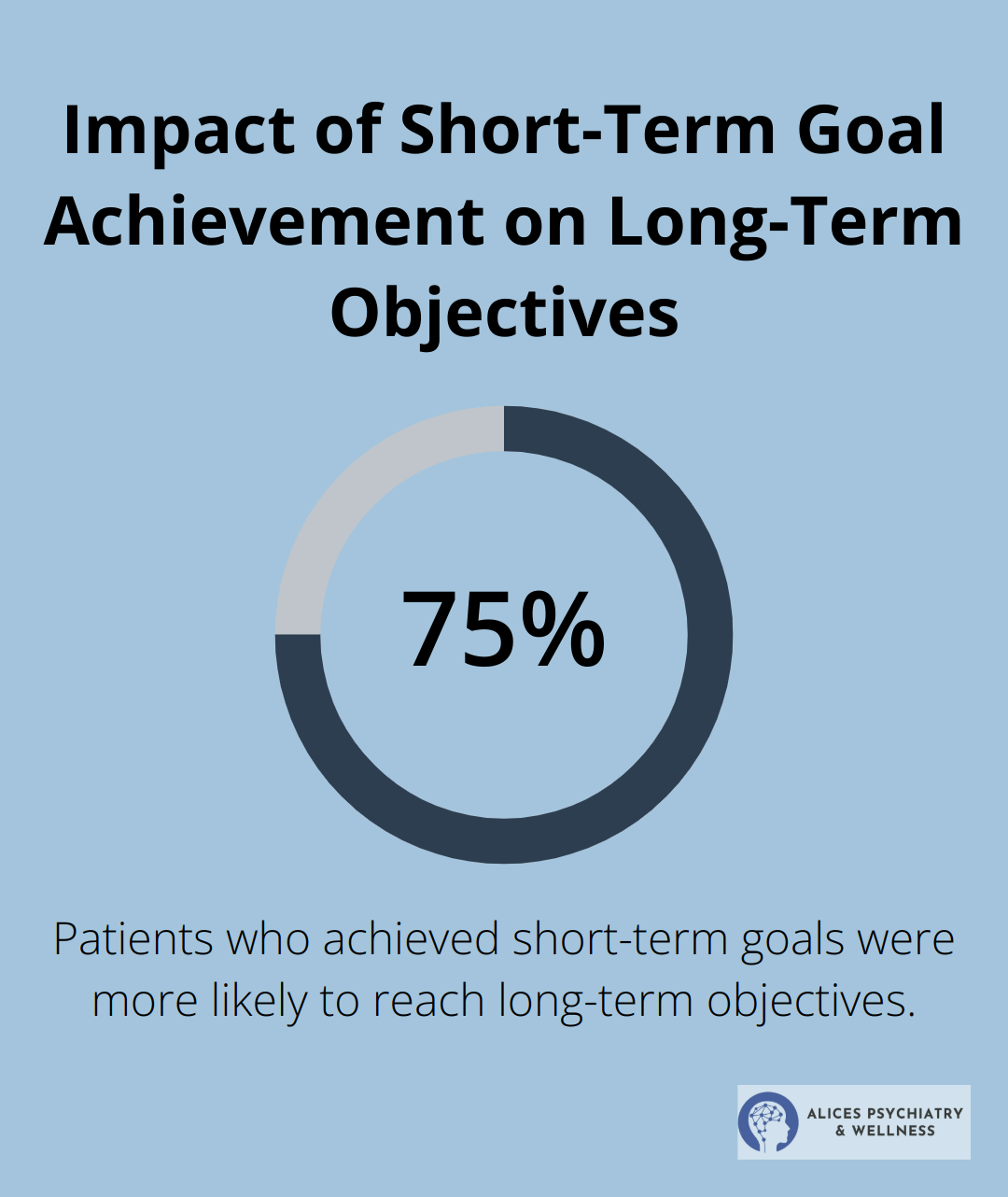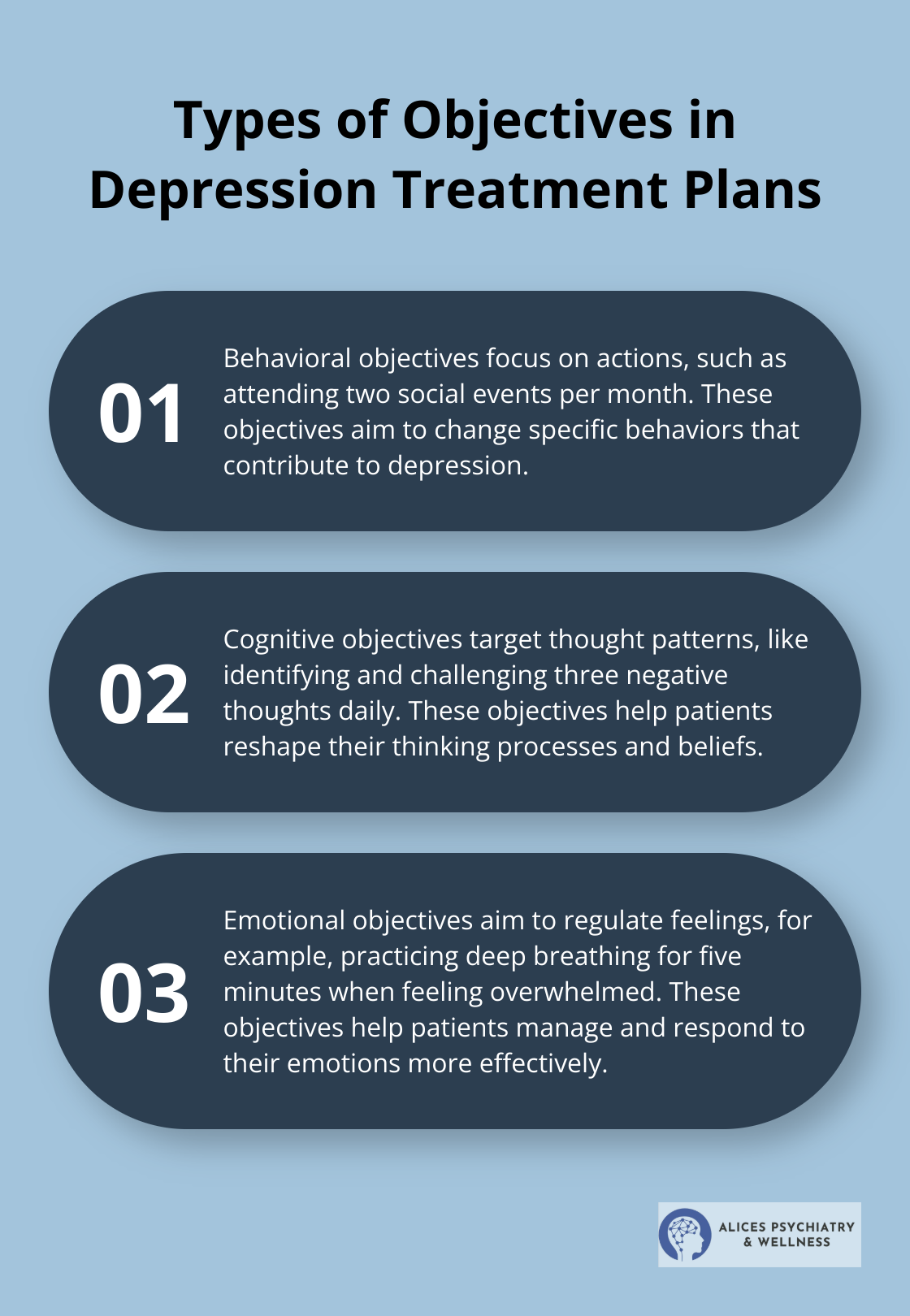Depression can be overwhelming, but a well-structured treatment plan can make a world of difference. At Alice’s Psychiatry and Wellness, we’ve seen firsthand how setting clear treatment plan goals for depression can lead to significant improvements in our patients’ lives.
This blog post will guide you through the process of creating an effective depression treatment plan, focusing on setting achievable goals and objectives. We’ll explore strategies to help you or your loved one take concrete steps towards recovery and improved mental health.
What Is a Depression Treatment Plan?
A Roadmap for Recovery
A depression treatment plan serves as a roadmap for recovery. It’s a collaborative effort between you and your mental health provider to guide you through your journey to better mental health. This plan outlines specific steps to manage depression symptoms and improve overall well-being.
A comprehensive treatment plan typically includes:
- A clear diagnosis
- Specific treatment goals
- Strategies to achieve those goals
For instance, a plan might incorporate weekly therapy sessions, medication management, and lifestyle modifications (such as regular exercise or improved sleep habits).
An NIMH-funded study showed that incorporating depression treatment into care for chronic health conditions improved well-being for both patients and their caregivers. This effectiveness stems from the unique nature of each person’s experience with depression.

Key Elements of an Effective Plan
An effective depression treatment plan should be both comprehensive and adaptable. It should address not only the symptoms of depression but also the underlying causes and contributing factors.
Essential components of a robust treatment plan include:
- Clear, measurable goals
- Specific interventions (e.g., cognitive-behavioral therapy or medication)
- Timeline for reassessment and adjustment
- Strategies for managing potential setbacks
- Resources for additional support
Tailoring Treatment to the Individual
The most effective treatment plans are those customized to the individual. A thorough understanding of your unique situation, including your personal history, lifestyle, and preferences, is paramount in creating an effective plan.
For example, if work-related stress contributes to your depression, your plan might include stress management techniques. If you have a history of substance abuse, strategies to address this alongside your depression treatment will be incorporated.
It’s important to note that a treatment plan is not static. Regular reviews and adjustments ensure it continues to meet your evolving needs. This personalized, adaptive approach is fundamental to long-term success in managing depression.
The Role of Professional Guidance
While self-help strategies can be beneficial, professional guidance is invaluable in creating and implementing an effective depression treatment plan. Mental health professionals bring expertise, experience, and objectivity to the process.
They can:
- Provide accurate diagnosis
- Recommend evidence-based treatments
- Monitor progress and make necessary adjustments
- Offer support during challenging times
As we move forward, let’s explore how to set meaningful goals within your depression treatment plan. These goals will serve as the foundation for your journey towards improved mental wellness and overall well-being.
How to Set Effective Goals for Depression Treatment
Setting effective goals forms the foundation of successful depression treatment. Well-defined goals can significantly improve treatment outcomes and provide a clear direction for patients.
Balancing Short-term and Long-term Goals
A depression treatment plan should include both short-term and long-term goals. Short-term goals provide immediate focus and quick wins, which boost motivation. These might include daily tasks like getting out of bed at a specific time or taking a short walk. Long-term goals address broader life changes and sustained improvement. These could involve returning to work or rebuilding relationships.
A study published in the Journal of Consulting and Clinical Psychology found that patients who set and achieved short-term goals were more likely to reach their long-term objectives in depression treatment. This finding underscores the importance of celebrating small victories along the way.

Applying the SMART Framework
The SMART framework makes goals more effective. This approach ensures that goals are Specific, Measurable, Achievable, Relevant, and Time-bound.
For example, instead of setting a vague goal like “feel better,” a SMART goal might be: “Engage in 30 minutes of physical activity three times a week for the next month to improve mood and energy levels.”
Practical Examples of Treatment Goals
Here are some examples of goals often seen in depression treatment plans:
- Sleep Improvement: “Establish a consistent sleep schedule, aiming to sleep 7-8 hours per night, 5 nights a week, within the next month.”
- Social Connection: “Reach out to one friend or family member per week for the next two months to rebuild social connections.”
- Cognitive Restructuring: “Identify and challenge three negative thoughts daily using a thought record for the next six weeks.”
- Medication Adherence: “Take prescribed antidepressant medication as directed, without missing a dose, for the next three months.”
- Stress Management: “Practice a 10-minute mindfulness meditation daily for the next four weeks to reduce stress levels.”
These goals are specific, measurable, and time-bound, making it easier to track progress and adjust as needed.
Personalizing Your Goals
Comprehensive treatment plans for depression should be tailored to individual needs across mild, moderate, and severe cases. Mental health providers work closely with each patient to develop a personalized set of goals that align with their unique situations and challenges.
Goal-setting is an ongoing process. As treatment progresses, goals may evolve. Regular check-ins with a mental health provider can help ensure goals remain relevant and challenging, yet achievable.
The next step in creating an effective depression treatment plan involves developing specific objectives that support these broader goals. These objectives provide a clear roadmap for the depression treatment journey and help translate goals into actionable steps.
Turning Goals into Action: Crafting Effective Objectives
The Power of Specific Objectives
Goals provide a broad direction, but objectives transform these into specific, actionable steps. For instance, if your goal is to improve social connections, an objective might be to initiate one conversation with a coworker each week. This specificity makes progress more measurable and achievable.
A meta-analysis suggested that behavioral activation is an effective treatment for depression as well as other outcomes, although the quality of most of the trials was modest.
Types of Objectives in Depression Treatment
Effective depression treatment plans typically include a mix of behavioral, cognitive, and emotional objectives:
- Behavioral objectives focus on actions (e.g., “Attend two social events per month”)
- Cognitive objectives target thought patterns (e.g., “Identify and challenge three negative thoughts daily”)
- Emotional objectives aim to regulate feelings (e.g., “Practice deep breathing for five minutes when feeling overwhelmed”)
Creating Measurable Objectives
To ensure effectiveness, objectives must be measurable. Instead of “Feel less anxious,” a measurable objective might be “Reduce anxiety scores on the GAD-7 scale by 5 points within two months.” This allows for clear tracking of progress and adjustment of the treatment plan as needed.

Advanced assessment tools help patients set and measure these objectives accurately. Patients with measurable objectives are often more likely to stick to their treatment plans long-term.
Time-Bound Objectives for Motivation
Setting time limits for objectives creates a sense of urgency and helps maintain motivation. For example, “Complete a 10-minute mindfulness exercise daily for the next 30 days” is more effective than an open-ended commitment to mindfulness.
Adjusting Objectives as Treatment Progresses
Objectives should remain flexible. As treatment progresses, some objectives may become easier to achieve, while others might need adjustment. Regular check-ins with your mental health provider (ideally bi-weekly) are essential to ensure your objectives remain challenging yet attainable.
This approach of breaking down depression treatment goals into specific, measurable, and time-bound objectives creates a clear roadmap for recovery. It not only makes progress more tangible but also boosts motivation and engagement in the treatment process.
Final Thoughts
An effective depression treatment plan with well-defined goals and objectives paves the way for recovery. Treatment plan goals for depression should be clear, measurable, and achievable to track progress and maintain motivation. Professional guidance from mental health experts ensures a tailored approach, providing accurate diagnoses and evidence-based treatments.
Seeking help for depression demonstrates strength, not weakness. The first step towards recovery can challenge you, but it will benefit your future well-being. With proper support and a personalized plan, you can overcome depression and regain control of your life.
Alice’s Psychiatry and Wellness offers compassionate, personalized care to help you achieve mental wellness. Our team provides comprehensive evaluations, medication management, and therapy services to support your recovery journey. Contact us today to start your path to improved mental health.





